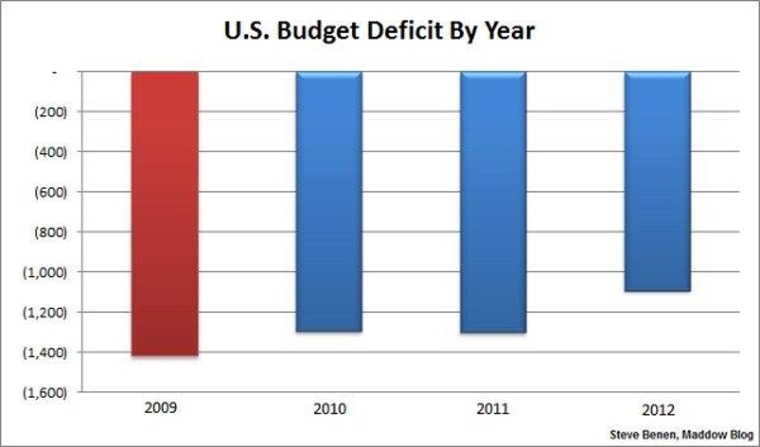As the job market improves and unemployment falls, one of the central attacks from Romney/Ryan against President Obama has to do with the deficit. The attack overlooks Paul Ryan's role in creating the massive deficit, the inconvenient fact that Romney hasn't presented a deficit-reduction plan, and the problem that the Romney/Ryan agenda would appear to make the deficit significantly worse, but that's their story and they're sticking to it.
It's worth noting, then, that as of today, the U.S. federal budget deficit has shrunk -- a lot.
I put together this new chart reflecting the deficit over the course of the last four years. It starts with the figures released in 2009, when the deficit reached a record high of $1.4 trillion. Why is the column in red? Because, thanks to fiscal years, Obama inherited a deficit of nearly $1.3 trillion from Bush/Cheney the moment he took the oath of office.
This year, however, according to the official data published by the Treasury Department, the deficit was $1.089 trillion.
When the president's critics spin this, they'll say, "The deficit was over $1 trillion again," and that will be accurate. What the criticism fails to note, however, is that (a) the deficit is now much smaller than it was when Obama took office; (b) this is the smallest deficit we've seen in four years; (c) this new figure represents an improvement of over $200 billion since last year; and (d) the main drivers of the remaining deficit are Republican policies.
I should note that all of this is predicated on the assumption that deficits are something bad to be avoided, and that a shrinking deficit is necessarily encouraging news. There's a competing school of thought -- which I'm sympathetic to -- that suggests the deficit is currently too small, and that given economic conditions, interest rates, and the current yield of Treasuries, we should be borrowing far more and investing that money in job creation.
But for the purposes of political conversation, such an argument is probably a non-starter; the public has come to believe a deficit that's getting smaller is good news.
If so, Obama has something to brag about -- very few presidents of the last generation can say they managed to shrink the deficit by over $200 billion, even during difficult economic times.
